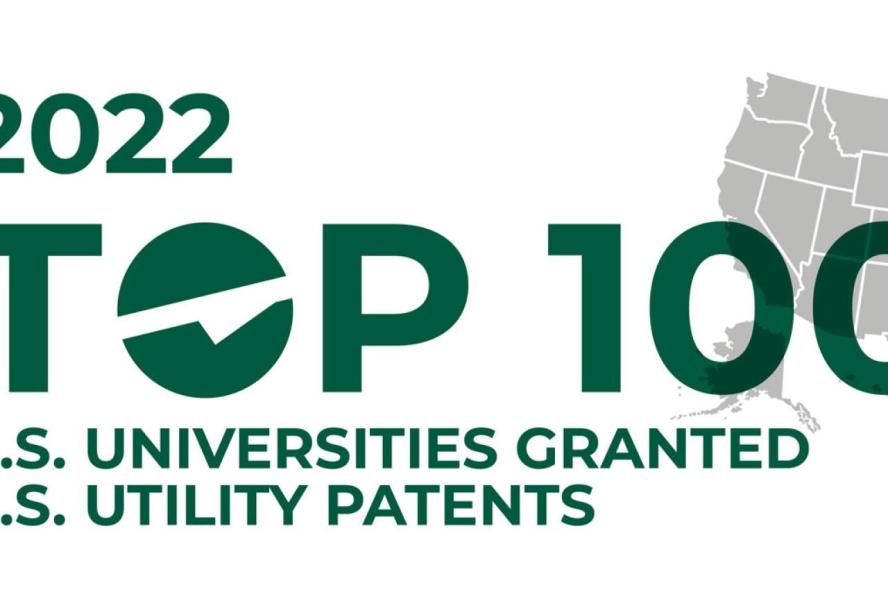-
About
- Departments & Offices
-
Academics
- Physician Assistant
- Special Master’s (MBS)
-
Admissions & Financial Aid
- Tuition & Fees
-
Student Experience
-
- Student Resources by Program
- Academic & Student Support
- Wellness & Wellbeing
- Student Life
- Events & Traditions
-
-
Research
- Research Labs & Centers
- Tufts University-Tufts Medicine Research Enterprise
-
Local & Global Engagement
- Global Health Programs
- Community Engagement
Tufts Ranks in Top 100 U.S. Universities Granted Utility Patents in 2022
Tufts was awarded 28 utility patents this year, demonstrating success from research across the university

Tufts ranks 66 in the Top 100 U.S. Universities Granted Utility Patents in 2022, a list published today by the National Academy of Inventors (NAI).
The list celebrates American innovation and showcases universities that play a large role in advancing innovation. Utility patents encompass new or improved—and useful—products, processes, or machines. See top 100 U.S. universities list.
“Tufts is honored to rank among the National Academy of Innovators' list of top universities granted U.S. utility patents,” said Caroline Genco, Tufts’ provost and senior vice president. “This recognition reflects our creative faculty and students, who persist in finding innovative solutions to our most complex problems, wherever that may lead them. Together, they create a growing and vibrant innovation ecosystem across Tufts.”
Tufts was awarded 28 utility patents this year, demonstrating success from research across the university, including at the School of Engineering, the School of Arts and Sciences, the School of Medicine, and the School of Dental Medicine. Tufts had 16 patents awarded to advances in engineering, with biomedical microdevices and silk-based biomedical products among those recognized.
A sampling drawn from across the university include:
- Working in collaboration with researchers at Northwestern University and the University of Nebraska, the School of Medicine’s Katya Heldwein led her research team to a patent for work related to virus compositions and methods for vaccination and research applications. Specifically, their work advances an understanding of non-neuroinvasive herpesviruses and alpha herpesviruses, and their oncolytic applications for cancer treatment.
- A patent for thread-based integrated functional devices builds on the pioneering research of Pooria Mostafalu, EG15, and Sameer Sonkusale, professor of electrical and computer engineering at the School of Engineering and head of the Nano Lab. Their work is advancing a new generation of implantable diagnostic devices and smart wearable systems. The patent recognized the potential of devices that integrate nano-scale sensors, electronics, and microfluidics into threads that can be sutured through multiple layers of tissue to gather diagnostic data.
- Tufts engineers also received a patent for “dynamic silk coatings for implantable devices,” an innovation from an inventor team led by Stern Family Professor David Kaplan and Doble Professor Fiorenzo Omenetto. The use of silk coatings to improve the mechanics and biocompatibility of implantable devices, promoting tissue growth and controlling inflammation, is part of a portfolio of research at Tufts that is revolutionizing medical care.
- At the School of Arts and Sciences, Misha Kilmer, William Walker Professor of Mathematics, and her research team were awarded a patent in collaboration with scientists at IBM for their work to generate and manage deep tensor neural networks. Kilmer, a SIAM Fellow recognized for contributions to numerical linear algebra and scientific computing, leverages tensor networks to extend one-dimensional states to higher dimensions. Tensor networks have crossover applications in quantum mechanics and large-scale machine learning.
- Pamela Yelick, AG89, professor of orthodontics at the School of Dental Medicine, and Ali Khademhosseini, were awarded two patents that claim dental pulp regeneration compositions and their methods of use (pulp—the innermost layer of the tooth—supports tooth vitality). The patent reflects Yelick’s ongoing focus on advancing tissue-engineering models that improve tooth recovery and healing.
NAI was founded in 2010 to recognize and encourage inventors with patents issued from the United States Patent and Trademark Office, to enhance the visibility of academic technology and innovation, encourage the disclosure of intellectual property, and translate the inventions of its members to benefit society.
The list of the Tufts lead inventors associated with the patents is found below:
School of Medicine
- Caroline Genco, Spiller Professor (Immunology) and Provost and Senior Vice President
- Philip Haydon, Grisard Professor (Neuroscience)
- Katya Heldwein, American Cancer Society, Massachusetts Division Professor (Molecular Biology and Microbiology)
School of Arts and Sciences
- Misha Kilmer, Walker Professor (Mathematics)
- Krishna Kumar, Robinson Professor (Chemistry)
- Michael Levin, Vannevar Bush Professor and Distinguished Professor (Biology and Biomedical Engineering)
School of Dental Medicine
- Pamela Yelick, Professor, Orthodontics, and Director, Division of Craniofacial and Molecular Genetics
School of Engineering
- Ayse Asatekin Alexiou, Associate Professor (Chemical and Biological Engineering)
- Sergio Fantini, Professor (Biomedical Engineering)
- David Kaplan, Stern Family Professor and Distinguished Professor (Biomedical Engineering)
- Usman Khan, Professor (Electrical and Computer Engineering)
- Fiorenzo Omenetto, Doble Professor (Biomedical Engineering)
- Karen Panetta, Professor (Computer Science, Mechanical Engineering, and Electrical and Computer Engineering)
- Igor Sokolov, Professor (Mechanical Engineering)
- Sameer Sonkusale, Professor (Electrical and Computer Engineering, Biomedical Engineering, and Chemical and Biological Engineering)
- Qiaobing Xu, Professor (Biomedical Engineering and Chemical and Biological Engineering)
- Hyunmin Yi, Associate Professor (Chemical and Biological Engineering)